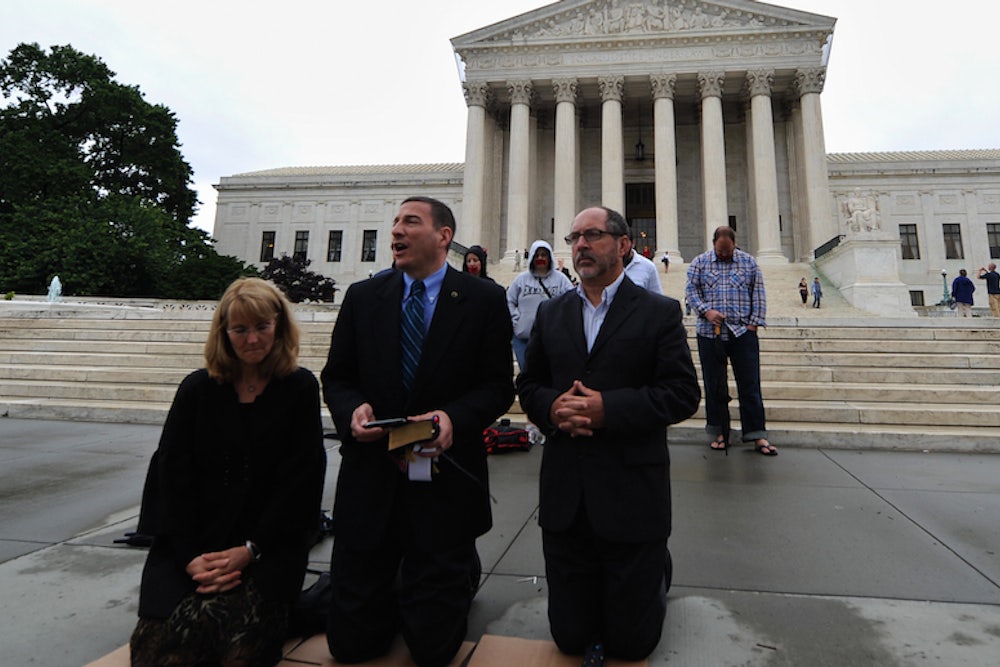Just a couple months ago, when same-sex marriage bans began collapsing around the country and the public rejected a few ham-fisted efforts to create or bolster legal protections for those who hoped to discriminate against gays and lesbians (both married and single) religious conservatives felt besieged—as if America had rapidly evolved into a society that doesn't tolerate Christian norms and practices anymore.
From the perspective of the men and women of great influence who until recently had been able to prevent the state from recognizing same sex marriages, the change has been jarring. But for the rest of us, it is a great advancement that has come at great costs, the least significant of which is a sense of alarm among those adjusting to the loss of a small measure of privilege.
The idea that civil rights for gays and lesbians are some kind of affront to people of faith, and a significant imposition on their liberty, is absurd on its face.
And I think the Supreme Court's holding in the case of Town of Greece v. Galloway kind of blows apart the notion that America is quickly becoming a country where Christian norms and practices are shunted to the realms of churches and households.
On Monday, in a 5-4 decision, an ideologically divided Court ruled that the town of Greece, New York is not endorsing Christianity (and thus violating the Establishment clause) by inviting local clergymen, who are overwhelmingly Christian, to begin its monthly board meetings with a prayer.
And while liberals (reflected in dissenting opinions) aren't exactly thrilled with the decision, the ruling hasn't driven the left into spasms of panic and existential dread about the coming Christianization of America.
Ian Millhiser of the Center for American Progress Action Fund worries that the ruling prefigures the abolition of a ban on government endorsement of religion. I share his concern, to an extent. And, relatedly, I'd love for a non-Christian house of worship to open in Greece and request inclusion in the town's ritual, to test the board's neutrality. (According to a footnote in Justice Scalia's dissenting opinion, the Buddhist temple in the town—which features prominently in Justice Breyer's dissent—has a Rochester mailing address and was not listed in the town directory.)
What's most striking to me about the decision, though, is the relative nonchalance with which Christian conservatives reacted to it. This is a pretty milquetoast development as far as the religious liberty crowd is concerned. But to anyone who grew up as a member of a religious minority in this country, Monday's ruling reinforces the blindingly obvious view that the country's institutions remain overwhelmingly deferential to Christian norms and practices. Escaping it, if you're inclined to escape it, is a real challenge.
Because in reality, as our society continues to become more tolerant, there will still be plenty of Greece, New Yorks, and, for the time being, a Supreme Court that will side with them when their practices make life awkward for atheists or people of different faiths.
And even if this doesn't bother you much, it makes conservative kvetching about pluralism in America seem very strange.
The government shutdown of 2013 has faded from public consciousness much more quickly than the shutdown that preceded it in 1995. But it created lasting memories for those of us who watched the whole thing unfold in a single day of legislative brinksmanship, and come to a close nearly three weeks later, as a reporter for the office of the clerk screamed “He will not be mocked—this is not one nation under God. It never was!" from the rostrum of the House.
In between, on October 9—about halfway through the shutdown—chaplain Barry Black opened the Senate with a striking prayer.
"Lord, when the federal shutdown delays payments of death benefits to the families of children dying on far-away battlefields, it's time for our lawmakers to say enough is enough. Cover our shame with the robe of your righteousness. Forgive us. Reform us. And make us whole. We pray in your merciful name. Amen."
Everyone noticed. But only because the condemnatory tone was a departure for Black, and many of the lawmakers he alluded to deserved his scorn. The religious content went mostly uncommented upon.
Black—a Seventh Day Adventist—routinely begins and ends his invocations with the same refrains to a single deity, and included a suggestive reference to the prophet Isaiah in that particular prayer. And somehow we have avoided a slow march to theocracy. The U.S. Congress is not very solicitous of polytheists, but this March, Black yielded his podium to the Dalai Lama.
Greece might find itself in trouble if it freezes out non-Christian houses of worship in the future. If a mosque were to open within its town limits, and request to partake in the monthly prayer, its board members could choose to be tolerant pluralists, or they could do away with sectarian prayer altogether, moving in the direction of Congress. Either way, it wouldn't be evidence that free practice is under assault, but that religious Christians have enjoyed and continue to enjoy a tremendous amount of deference from the broader public. The Supreme Court proved it this week. Conservatives should be thrilled.
